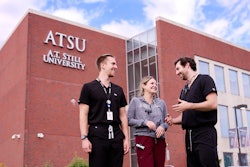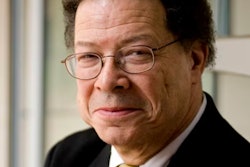Meeting the Challenges Of ChangeTIAA-CREF’s BeRtram L. Scott discusses how the legendary financial institution responds to new environments in its quest to continue to help higher education professionals
By Frank L. Matthews
 In an era in which change is very much the norm, some would argue that a no-nonsense financial institution like TIAA-CREF changes at its peril. Not so, according to Bertram L. Scott, the executive vice president for product management at TIAA-CREF, one of the world’s largest retirement systems and leading providers of financial services to the education and research community.
In an era in which change is very much the norm, some would argue that a no-nonsense financial institution like TIAA-CREF changes at its peril. Not so, according to Bertram L. Scott, the executive vice president for product management at TIAA-CREF, one of the world’s largest retirement systems and leading providers of financial services to the education and research community.
Like any viable organization, TIAA-CREF’s success and that of its clients are very much tied to strategic growth and change. Their task of “fixing what is broken and not that which is not” is of great importance to the thousands of aging, as well as new higher education and research professionals.
Having weathered the criticism surrounding the compensation and governance issues of its chairman Herb Allison and that of companies in their portfolio, TIAA-CREF now must plot a successful strategy based on today’s economic and demographic realities.
Recently, Black Issues sat down with Scott, who oversees the company’s Product Management Group, which includes pensions, individual wealth management, individual protection, educational savings, institutional asset management and business development, to discuss how the company is changing to respond to their customers’ demands and changing needs.
BI: How would you characterize the financial sophistication of today’s higher education professionals?
BLS: My experience is that people in higher education, whether they are faculty or staff or administrators, are very interested in what is going on in their personal lives, about retirement. They have time to research, because the sheer nature of being on a college campus creates an environment to dig deeper than I think the average person does in investigating things. So we get very enlightened, very bright people who ask us some questions about what we do and how we do it. So I would say, without being arrogant but understanding the marketplace, that our constituency tends to be more informed than the general marketplace. That puts greater pressure on us to perform and to react when appropriate.
BI: What about those who may not be as sophisticated?
BLS: I think we have to serve them as well as those that are well informed. I think the way we go about putting together retirement plans, the range of investment options, the advice we give them, the fact that we have people who come to campus to talk to the administrators about the retirement plans, it sets us apart from everybody else. We are one of the only companies that serve those kinds of institutions, when you think about it. You don’t see our competitors on those campuses. We serve them because that’s our mission, whether you are a historically Black college or you are one of the Ivy Leaguers. It’s our mission to serve higher education. We never step away from that mission.
BI: How are the demographics of higher education professionals and the longevity of people in general driving the decision making?















